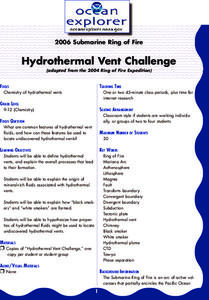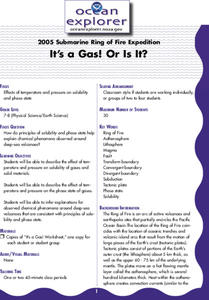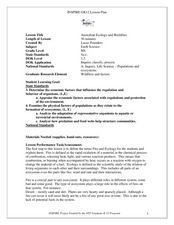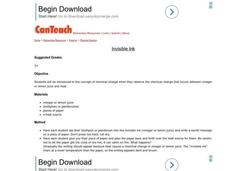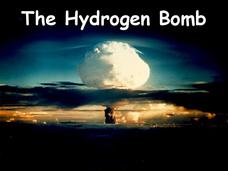NOAA
Where There's Smoke, There's ...
A remotely operated vehicle approaching a volcano was engulfed by molten sulfur where the plumes of fluids contained the highest concentrations of aluminum ever recorded. This isn't science fiction or an April fools joke, though it did...
Curated OER
Lab Safety
In this safety learning exercise, students read about lab safety including safety equipment and procedures. Students learn about reading chemical labels and the MSDS. This learning exercise has 14 matching and 13 short answer questions.
Curated OER
Applied Science - Physics Post-Lab
Students investigate energy. In this Physics lesson, students explore different sources of energy: heat, nuclear, and chemical. Students sing an electricity song.
Curated OER
Hydrothermal Vent Challenge
Give our ocean voyagers the "Hydrothermal Vent Challenge!" It is a worksheet that guides them through an exploration of hydrothermal vents and the chemical reactions that occur when lava meets seawater. Using a collection of websites,...
Curated OER
What's for Dinner?
View a video presentation comparing chemosynthesis to photosynthesis. Review the findings of the 2004 Ring of Fire Expedition that studied biological communities around the hydrothermal vents of the Mariana Arc. In collaborative groups,...
Curated OER
It's a Gas! Or is it?
Students discover the principles of solubility and phase state and their influence on chemical phenomena observed around deep-sea volcanoes. They describe the effect of temperature and pressure on solubility of gasses and solid materials.
Curated OER
Australian Ecology and Bushfires
Eighth graders discuss the different types of ecosystem. For this earth science lesson, 8th graders explain the benefits and harm of fire. They research articles about bush fires or controlled burn instance and share it with the class.
Curated OER
Invisible Ink
Students are introduced to the concept of chemical change when they observe the chemical change that occurs between vinegar or lemon juice and heat.
Curated OER
Animals of the Fire Ice
Students examine ocean life by identifying methane hydrates. In this ocean life lesson, students research organisms that live in the coldest, deepest parts of the ocean and live off methane hydrates. Students create a group...
Curated OER
It's a Gas! Or is it?
Students describe the effects of temperature and pressure on solubility of gases and other materials. In this investigative lesson students read an article and answer questions about it.
Curated OER
Elements, Compounds, and Mixtures
In this matter worksheet, students review the three forms of matter by reading a poem and completing 1 matching and 5 short answer questions.
Curated OER
Ammonium Nitrate - Is it worth the Risk?
Students consider that ammonium nitrate is used as a fertilizer and an explosive. They study the chemistry of ammonium nitrate and consider the advantages and disadvantages of this compound. The dual nature of Ammonium Nitrate was...
Curated OER
Oxidation and Combustion: Chemical Reactions in Fire
Learners study oxidation and define vocabulary pertinent to it. In this oxidation lesson plan students make predictions and create experiments
Curated OER
2005 Submarine Ring of Fire Expedition: What's for Dinner?
Students compare and contrast photosynthesis and chemosynthesis as sources of primary production for biological communities, and describe sources of primary production observed in biological communities associated with volcanoes of the...
Curated OER
Animals of the Fire Ice
Students study ice worms and describe how they interact with other species. In this methane hydrate lesson students study ice worms and hydrate shrimp to learn their behavior and can participate in an optional activity.
Cornell University
Atomic Bonding
Explore the connection of surface area to bonding within atoms. Learners complete lab investigations to model changing surface area with different sizes and concentrations of atoms. A flour fireball demonstration follows the labs to...
National Institute of Open Schooling
Compounds of Carbon Containing Halogens (Haloalkanes and Haloarenes)
Halogens comes from a Greek word which translates to make salt. Lesson 27 in the series of 36 teaches pupils about halogens. Pupils read, discuss, and answer questions in order to learn about haloalkanes and haloarenes. From defining...
Calvin Crest Outdoor School
Survival
Equip young campers with important survival knowledge with a set of engaging lessons. Teammates work together to complete three outdoor activities, which include building a shelter, starting a campfire, and finding directions in the...
Mr. E. Science
Volcanoes
What is the difference between a shield volcano and a cinder cone volcano? How does the flow of lava influence the type of rock that's formed? A presentation on different aspects of volcanoes answers these questions for middle school...
Science Geek
The Hydrogen Bomb
Recycled Russian nuclear weapons provide 10 percent of the nuclear energy that the United States uses. The short presentation discusses the Teller-Ulam device. It provides a diagram of the parts as well as a description of the four...
American Chemical Society
Preparation and Combustion of Biodiesel
The United States is the world's largest producer of biofuel. During an in-class investigation, young scientists produce their own biodiesel. They burn a sample of it to determine the heat of combustion. Then they discuss the results...
Curated OER
Fireworks
For this fireworks worksheet, learners read about pyrotechnics and the chemical make-up of fireworks. They are given a chart of elements and the colors they emit. Students answer three critical thinking questions about fireworks and...
Curated OER
Activity #3 Are Particles "Real?"
Students verbalize a simple particle theory, They apply their particle theory to explain what happens during chemical reactions and how this theory supports the law of conservation of matter. Pupils comprehend that the atomic theory,...
Curated OER
Connections to Fine Art: What Happens in a Kiln?
In this kiln activity, students read about how temperature effects the results of fired pottery. They answer questions using the information and data given.





